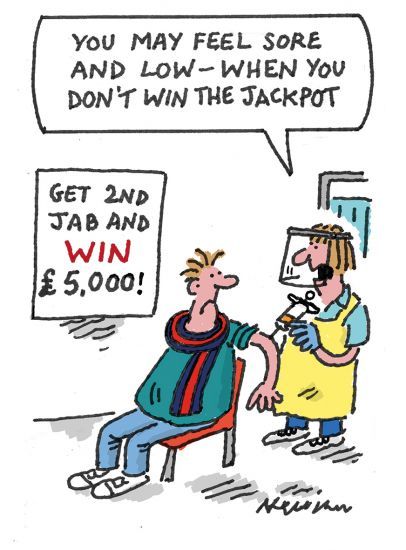
Some universities around the world wanting to encourage students to get their Covid-19 vaccine have opted for the stick approach of simply insisting that getting jabbed is a condition of studying on campus. But in the UK a carrot approach appears to be the preferred option and, in the case of the University of Sussex, a rather large carrot at that with the institution offering those who are fully vaccinated the chance to win £5,000. Every student is being entered in a draw, according to BBC News, with the winners able to claim the prize if they can prove they have been double jabbed or are exempt. The Sussex vice-chancellor, Adam Tickell, said the financial cost to the university was small compared with the potential educational and social costs of disruption from Covid outbreaks.
Of course, if you don’t manage to strike it lucky with the vaccine-inspired draw at Sussex, there are always the cash incentives being bandied around the English sector by universities overrun with demand for courses owing to the boost in A-level results. At the University of Leeds for instance, students wanting to study law or business are being offered £10,000 and free accommodation if they defer entry to next year. Deputy vice-chancellor Peter Jimack said teacher-assessed grades, which had led to an increase in the number of students gaining top marks, had made it difficult to predict demand and some courses were full as a result, BBC News reported. Similar offers have been made elsewhere for medical courses, which have a limited number of places because of clinical training constraints.
When embarking on work to develop a Covid vaccine, University of Oxford professor Dame Sarah Gilbert would have had a number of hopes, probably chief among them the small matter of producing a jab that could potentially save millions of lives around the world. But one of the lead scientists behind the Oxford-AstraZeneca vaccine cannot have envisaged a Barbie doll being created in her honour. Toy company Mattel has made the doll in her likeness as part of attempts to encourage girls to consider careers in science, The Times reported. Dame Sarah said that although she initially found the gesture “very strange”, she did hope it would inspire girls to follow her path in science. According to the newspaper, she is not the first STEM Barbie doll though, with Mattel having created others including Brazilian biomedical researcher Jaqueline Goés de Jesus.
Relations between China and Australia have declined in the past few years – but the knock-on effect in plummeting relations between the Canberra government and university vice-chancellors in Australia is pretty sharp too. The evidence of this was clear in comments made by former prime minister Malcolm Turnbull speaking during a webinar hosted by La Trobe University. He referred to Australian vice-chancellors behaving like sycophantic shop attendants and reciting Chinese Communist Party “talking points” when tensions between the countries began to escalate. He said that universities and the government alike must stick to their principles in dealing with China. “When you are the prime minister of a middle power like Australia, in the imperial capital, whether it is Beijing or Washington, they regard deference as their due. And the only way to be respected is to stand your ground,” he told the webinar.
Criticism of a US university over guidance on what faculty members may say in their classrooms about face masks and vaccinations has led to a review of the advice. The initial classroom speech guidance from the University of Iowa said staff “may only make statements regarding mask usage or vaccinations in the context of course material discussions of health-related issues”, but should not make “a statement regarding the value of the choice or any value judgments about decisions not to be vaccinated”, Inside Higher Ed reported. However, the guidance prompted criticism from staff and students who felt they should be able to explain the proven health benefits of masks and vaccines, while others said the advice impinged on academic freedom. It was later removed from the university’s website pending “revisions”.
Register to continue
Why register?
- Registration is free and only takes a moment
- Once registered, you can read 3 articles a month
- Sign up for our newsletter
Subscribe
Or subscribe for unlimited access to:
- Unlimited access to news, views, insights & reviews
- Digital editions
- Digital access to THE’s university and college rankings analysis
Already registered or a current subscriber? Login



